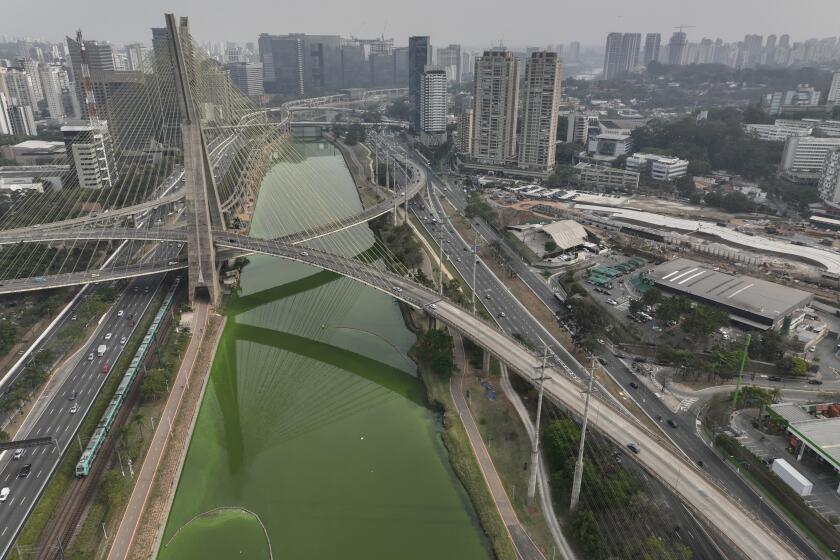Steadfast in Defiance, Cleric Gains Stature With Iraq Masses
BAGHDAD — Militant cleric Muqtada Sadr’s refusal Tuesday to meet with a delegation of Iraqi religious and political leaders is the clearest indicator yet that recent fighting in Najaf has strengthened the anti-American leader, some analysts say.
The snub, which followed last week’s breakdown of talks with envoys of interim Prime Minister Iyad Allawi, made it clear that Sadr expected any resolution to the two-week confrontation to proceed on his terms and timetable. The message was reinforced by the 1,000 militiamen who greeted the delegation with raised fists and shouts of “Long live Muqtada!”
Although Allawi’s government had decided to resume military operations to oust Sadr’s forces from the sacred Imam Ali shrine they have occupied, he opted to let a new round of talks proceed.
Several observers say Allawi and U.S. forces have no viable options other than trying for a negotiated end to the uprising because attempting to crush Sadr militarily would carry too high a political price.
“In all probability, it would take an unacceptable level of force in and around the shrine,” noted Cliff Kupchan, a Middle East specialist at the Nixon Center in Washington. “Whether Iraqi troops do this or Americans, it would be a generational setback for U.S. legitimacy in the Arab world.”
Inherent in such assessments is the belief that, even though Sadr’s forces chose to confront the U.S. militarily from one of the holiest sites in Shiite Islam, the public would almost certainly hold the Americans and Allawi’s U.S.-backed administration responsible for damage from any operation to crush him.
Although many Iraqis denounce his tactics, Sadr’s strident militancy has made him the embodiment of resistance to the continued presence of more than 140,000 U.S. troops in Iraq.
The Shiite cleric’s latest confrontation with American forces has brought new signs of support, as Sunni Muslim militants in the town of Fallouja, west of Baghdad, reportedly dispatched supplies to Sadr’s forces. Some prominent Sunni voices in Baghdad have advised the government against launching an attack, and political and religious figures have called for efforts to bring Sadr into the political process.
“Is it better for Iraq and the political process and for democracy to embrace these people or suppress these people?” said political analyst Khudeir Dulaimi in Baghdad.
“It is better to engage the country [including] his followers, who are very great in number. If we suppress them, they will emerge again.”
Hussein Shahristani, a nuclear scientist who had sought the prime minister’s job, agreed. “Despite the hundreds killed in Najaf and other cities, the sense I get ... is that people are more sympathetic to Muqtada than ever before,” he said.
Analysts believe that a key to Sadr’s political clout has been his emergence as the only national symbol of defiance to the massive U.S. military presence that remains in Iraq despite the formal hand-over of sovereignty. As the U.S. presence grows more unpopular, Sadr’s aura gains more luster.
“He’s filled a vacuum of the need to express opposition to the occupation and the current government,” noted Shibley Telhami, a Middle East specialist at the University of Maryland. “The insurgents are faceless or disorganized. Sadr’s face has become a symbol for opposition.”
Sadr and his associates’ skillful use of Arab satellite television has propelled the cleric’s dour, pudgy image beyond Iraq’s borders, a phenomenon that has only enhanced his stature inside the country.
In his public statements, Sadr has made opposition to the American presence tantamount to a patriotic duty.
“Everyone can learn from him on how he has used the media to communicate his message,” noted Bruce Hoffman, acting director of the Rand Corp. Center for Middle East Public Policy in Washington. “He came out of nowhere into a vacuum to become the most recognized populist political figure in Iraq.”
In some ways, Sadr’s ability to extend his appeal beyond the disaffected Shiite poor to the middle class has been a surprise. Believed to be in his late twenties or early thirties, Sadr apparently never finished his seminary studies and speaks in a fiery, unpolished tongue.
But his growing appeal to people like Alaa Mohammed has greatly complicated government efforts to resolve the Najaf crisis.
Mohammed is the kind of citizen Iraq needs if the country is to complete its perilous journey toward democracy. The 29-year-old journalist is educated, articulate, politically engaged -- and a follower of Sadr.
“Muqtada is our chief,” Mohammed declared with no flicker of doubt. “He’s the one we want. He was the only religious authority who faced the occupying forces.”
A poll by Iraq’s Center for Research and Strategic Studies in Baghdad shortly after thousands of militiamen loyal to Sadr launched a springtime uprising against the U.S.-led coalition indicated that the cleric was second only to Iraq’s venerated Grand Ayatollah Ali Sistani in drawing support. (Allawi, who was not yet prime minister, trailed far behind.)
Although the uprising by Sadr’s militia ended in an inconclusive truce -- and the current fighting, too, has produced no measurable military gains -- it is the very act of fighting that seems to add to Sadr’s stature.
“He’s a populist, a grass-roots political figure,” Hoffman said.
“He’s not polished, not terribly intellectual and doesn’t have an accent leavened by decades in exile, but these have become his strengths. At a very visceral level, he appeals to many Iraqis.”
Chu reported from Baghdad and Marshall from Washington. Times staff writer David Holley and special correspondents Said Rifai, Caesar Ahmed and Saif Rasheed in Baghdad contributed to this report.
More to Read
Sign up for Essential California
The most important California stories and recommendations in your inbox every morning.
You may occasionally receive promotional content from the Los Angeles Times.











